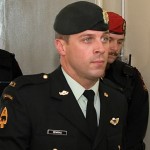Judging War from the Sidelines
 Capt. Robert Semrau is charged with killing a mortally wounded Taliban insurgent on the battlefield. Yet, he will not be judged by a jury of his peers: None of his court martial panel comes from the combat arms, or has had to make decisions under fire.
Capt. Robert Semrau is charged with killing a mortally wounded Taliban insurgent on the battlefield. Yet, he will not be judged by a jury of his peers: None of his court martial panel comes from the combat arms, or has had to make decisions under fire.
A concern about the court martial of Capt. Robert Semrau, charged with killing a mortally wounded Taliban insurgent on the battlefield, is that he gets a fair trial.
What makes people like me uneasy, is that none of the five-member panel comes from the combat arms, or has ever had to make decisions on a battlefield while under fire. No “peers” judge Semrau’s actions.
The court martial panel will decide guilt or innocence by majority decision, unlike civilian trials where the jury must reach a unanimous verdict. Semrau’s panel consists of a commodore, a lieutenant-colonel, two majors and a captain – one navy, two air force, two army - all from logistic or administrative services. From their individual and service backgrounds, none has an understanding or empathy with what a patrol or platoon commander requires outside the wire.
Why no one from combat arms was appointed on the panel is puzzling. It causes some to wonder if we are undergoing our own version of a Breaker Morant case, where an Australian soldier in the Boer war was court martialed -- which decides guilt or innocent by majority decision, as opposed to unanimous jury verdicts required in civilian trials -- and found guilty for political considerations.
Semrau’s defense lawyer is from the Judge Advocate General’s department, and works for the same boss as JAG prosecutors. His job is to persuade the panel what it’s like to command a patrol in no-man’s-land, where ambushes are a constant threat, and where a patrol commander has only himself to consult when the unexpected happens. And in war, the unexpected is a constant.
Defense lawyers are not allowed to solicit witnesses who have first-hand knowledge and could give the panel a graphic idea of what a patrol commander faces.
Witnesses must come forward and offer to testify – which I did early on, and then was surprised to learn no one else had volunteered. Of all the WWII and Korea veterans around, I’m sure any number would willingly testify. The reason they haven’t come forward, is probably because they don’t know.
I subsequently attended the Cavalry Lunch at the Royal Canadian Military Institute, and made a pitch to members that veterans who’ve been in battlefield situations could help Semrau’s lawyers persuade the panel of how life outside the wire is different from any other aspect of the military. WWII and Korea vets are the core of RCMI’s membership. I also contacted Koreavetnews.com, to see if they knew vets who might testify.
Semrau is the first Canadian soldier in any war, to be charged with murdering a wounded enemy on the battlefield. His lawyer is Maj. Steve Turner (819-994-7186 in case you’re a combat vet who’s led patrols and is willing to talk).
When his patrol of mostly Afghan National Army (ANC) soldiers was ambushed in 2008, one Talib was killed and another mortally wounded. Semrau’s options were to abort the patrol to get medical help to an enemy they thought was going to die anyway. Or to continue the patrol and leave the wounded insurgent to the mercies of ANA soldiers who had already spat on and kicked the guy.
Anyway, the patrol carried on after the insurgent was shot twice in the chest (Semrau was charged with murder two months later). While it may be news to Prime Minister Harper and his top generals that Afghanis are prone to torture, it was a prescient Rudyard Kipling who penned the verse:
When you’re wounded and left on Afghanistan’s plains,
And the women come out to cut up what remains,
Jest roll to your rifle and blow out your brains,
An’ go to your Gawd like a soldier.